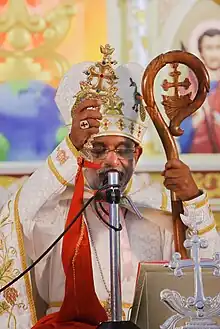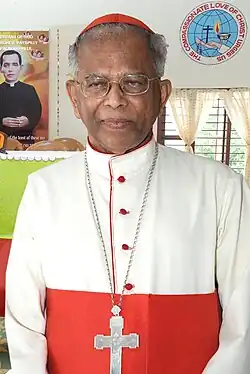Major Archbishop of the Syro-Malabar Church ܪܒܝ ܡܝܛܪܵܦܘܿܠܝܼܛܵܐܹ ܕܥܸܕܬܵܐ ܕܣܘܼܕܝܵܝܹܐ ܡܲܠܲܒܵܪܵܝܹܐ | |
|---|---|
| Bishopric | |
 | |
| Incumbent: Raphael Thattil 11 January 2024 | |
| Style | Mar |
| Location | |
| Country | India |
| Headquarters | Mount Saint Thomas, Kakkanad |
| Information | |
| First holder | Antony Padiyara |
| Denomination | Catholic Church |
| Sui iuris church | Syro-Malabar Church |
| Rite | East Syriac |
| Archdiocese | Ernakulam-Angamaly |
| Cathedral | St. Mary's Syro-Malabar Cathedral Basilica, Ernakulam |
| Co-cathedral | Mar Hormizd Syro-Malabar Cathedral, Angamaly |
| Website | |
| syromalabarchurch.in | |
The Syro-Malabar Catholic Church, an Eastern Catholic Church within the Catholic Church, is led by a major archbishop and the Metropolitan Archbishop of the Archeparchy of Ernakulam-Angamalay in Kerala, India.
Major Archbishops of Ernakulam-Angamaly
| No. | Term | Portrait | Name | Date and Place of Birth | Age at start/end of Term | Notes |
|---|---|---|---|---|---|---|
| 1 | 23 April 1985 – 11 November 1996 |
11 February 1921 | 64 / 75 (†79) | First Major Archbishop of the Syro Malabar Church. Established the Syro Malabar Synod of Bishops. | ||
| 2 | 6 January 1997 – 1 April 2011 |
 |
29 May 1927 | 70 / 83 (†83) | Appointed by Pope John Paul II as the Apostolic Administrator before becoming the Full Time Major Archbishop in 1999. Helped Established the Eparchy of St. Thomas of Chicago along with other dioceses. | |
| 3 | 24 May 2011
– 7 December 2023
|
 |
19 April 1945
Thuruthy, Travancore |
67 / 78 | First Major Archbishop elected by the Synod of Bishops. Established All India Jurisdiction by the establishment of Eparchy of Shamshabad and Eparchy of Hosur. Also established the Eparchy of Mississauga,Eparchy of Melbourne, Eparchy of Great Britain, along with the Apostolic Visitation to Europe. | |
| 4 | 9 January 2024 — present |
 |
21 April 1956
Trichur, Kerala |
67 | Thattil had previously served as the apostolic visitor of the Syro-Malabar Catholic Church for Syro-Malabar resident "outside their proper territory" in India and as bishop of the Eparchy of Shamshabad since 2017.[1] |
Brief History
The Vicariate was established in 1896, when the first archbishop was appointed. The Syro-Malabar's current hierarchical structure was established in 1923, and Ernakulam elevated as an archdiocese. In 1993, when Syro-Malabar Catholic Church was raised to major archiepiscopal church, Ernakulam became the seat of the major archbishop.
Bishop of Angamaly
Through the Synod of Diamper, the Latin Catholic Padroado missionaries abolished the All India jurisdiction and erected the Diocese of Angamaly, suffragan to the Padroado Primatal See of Goa, in place of the Metropolitanate of All India.[2]
- Francisco Ros (1599-1610)
Archbishops of Cranganore
- Francisco Ros (1610-1624)
- Stephen Brito, S.J. (18 Feb 1624 - 2 Dec 1641 Died)
- Francisco Garcia Mendes, S.J. (2 Dec 1641 - 3 Jan 1653) Garcia was overthrown through the Coonan Cross Oath. However he remained archbishop of Cranganore for a small minority of Latin Christians until his death in 1659.
- Joseph Maria Sebastiani (1656–1663) - intrusus as the Vicar apostolic of Malabar
- Palliveettil Chandy (Alexandre de Campo) (1663-1687)[3]
- Shemon of Ada (1700 – 1720) - sent by Patriarch Eliah IX Yohannan Augen, he was arrested by Latin missionaries. Hoping to get freed, he consecrated Angelo Francisco, the Carmelite Vicar Apostolic of Verapoly in 1701. But was imprisoned in Pondicherry where he was found dead in a well.
- Gabriel of Azerbaijan (1705–1730)- sent by Patriarch Eliah X Augen, he maintained considerable support among both factions of Saint Thomas Christians.
- Kariattil Iousep (1783– 1787)
- Paremakkal Thoma (1787–1799) - never been consecrated as bishop, but appointed as Gobernador (Administrator)
- Abraham Paulose Pandari (1796–1799) - consecrated by Chaldean Catholic Patriarch Yohannan VIII Hormizd, briefly recognised by Dionysius I and Paremmakkal Thoma in 1799, but never recognised by the Pope.
- Thoma Rokkos - consecrated by Chaldean Catholic Patriarch Joseph VI Audo, achieved limited recognition from a section of Saint Thomas Christians of both factions, received by the Jacobite Metropolitan in Angamaly, however excommunicated by the Pope.[4]
- Yohannan Elia Mellus (1874 – 1882) - sent by Patriarch Joseph VI Audo, consolidated strong support among the Catholic Saint Thomas Christians, but excommunicated by the pope. He led the movement which led to the formation of the Chaldean Syrian Church and the erection of separate Syro-Malabar hierarchy.[2][5][6][7][4]
Vicar Apostolics of Kottayam, Thrissur, Ernakulam and Southists
Following the schism, the pope having abandoned the latinisation policy, separated St. Thomas Christians in 1887 from the Vicariate of Verapoly, the local Latin Catholic hierarchy.[4] Initially they were organized under two vicariates, Thrissur and Kottayam. Later in 1896, Ernakulam vicariate was formed by bifurcating southern parts of Thrissur and northern parts of Changanacherry. During the same time native prelates were also appointed for all three vicariates. In 1911 a fourth vicariate was established in Kottayam for southists exclusively. I
|
Kottayam (Changanacherry)
|
Thrissur
|
|
|
Archbishop of Ernakulam
- Augustine Kandathil (1923 - 1956)
Archbishops of Ernakulam and Changanacherry
|
Changanacherry
|
Ernakulam
|
References
- ↑ "Pope Francis confirms election of head of Syro-Malabar Church". Vatican News. 10 January 2024. Retrieved 10 January 2024.
- 1 2 Eugène Tisserant: Eastern Christianity in India. Longmans, Green and Co., London 1957, 112-119
- ↑ "Divisions and Rite of the Churches- Syro Malabar Church, Malankara Syriac Orthodox Church, Malankara Orthodox Syriac Church, Thozhiyur Church, Malankara Mar Thoma Syrian Church, Syro Malankara Church, Chaldean Syrian Church". nasrani.net. 14 January 2007. Retrieved 20 May 2022.
Bishop Sebastaini, then consecrated Alexander Parampil as the Bishop.
- 1 2 3 Perczel, István (2013). Peter Bruns; Heinz Otto Luthe (eds.). "Some New Documents on the Struggle of the Saint Thomas Christians to Maintain the Chaldaean Rite and Jurisdiction". Orientalia Christiana: Festschrift für Hubert Kaufhold zum 70. Geburtstag; pp. 415-436. Wiesbaden: Harrassowitz Verlag.
- ↑ Georg Graf: History of Christian Arabic literature. 4th Bd Apost Bibl. Vaticana, Città del Vaticano 1951, 112f
- ↑ Joseph Habbi: Les Chaldéens et les Malabar au 19e siècle.In: Oriens Christianus 64 (1980) 82-107.
- ↑ Wilmshurst, David (2000). The Ecclesiastical Organisation of the Church of the East, 1318–1913. Louvain: Peeters Publishers. ISBN 9789042908765.